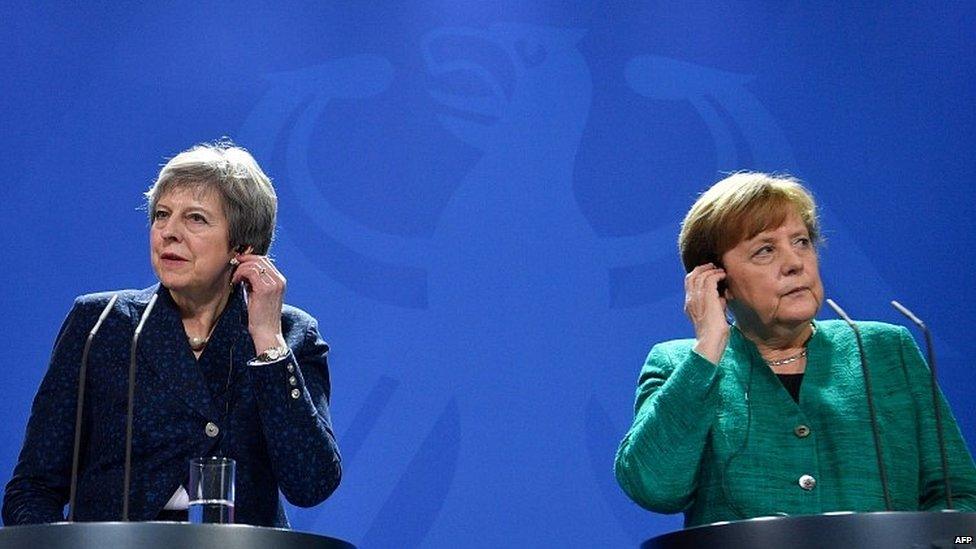May: New security deal should be effective by next year
- Published
Theresa May: "Those who threaten our security would like nothing more than to see us fractured"
Theresa May has called for a new "deep and special partnership" to ensure the UK and EU can continue to work together on security after Brexit.
She said new arrangements in foreign and defence policy cooperation should be effective by next year.
In a speech to the Munich Security Conference the prime minister said the UK would remain committed to Europe's security after leaving the EU.
New security arrangements have yet to be negotiated for after Brexit.
Theresa May said that, without cooperation, the UK would no longer be able to help the European police agency Europol as it currently does or extradite suspects as quickly.
Theresa May's response to Brexit 'extremely regrettable' remark.
To maintain coordination on security Theresa May said the UK and EU should continue to work together on sanctions, operations on the ground and developing capabilities in defence, cyber and space.
The prime minister warned that "rigid institutional restrictions or deep-seated ideology" should not jeopardise the security of UK citizens.
"We must do whatever is most practical and pragmatic in ensuring our collective security," she added.
She said the UK and EU's enemies would "like nothing better than to see us fractured".
President of the European Commission Jean-Claude Juncker said the "security bridge between the UK and the EU would still be maintained" but added "you cannot mix it up with other issues."
Theresa May noted that the EU had comprehensive relationships with other countries on trade and argued that there is "no legal or operational reason" why similar agreements could not be reached on security.
During talks with Angela Merkel on Friday, Mrs May said both sides need to be "bold and ambitious" in framing their future relations.
The German chancellor said that while the UK could not replicate its existing membership outside the EU, she wanted relations to be "as close as possible".
EU member states currently work closely in the fight against organised crime and terrorism.
Key initiatives include the European Arrest Warrant - under which suspects can be speedily extradited between member states - Europol, the EU intelligence agency, and the Schengen Information System of real-time alerts about suspects.
The UK says that while the legal framework for its membership of these arrangements will end when it leaves the EU in March 2019, it wants to draw up new working arrangements - which ministers have described as being "as close to the status quo as possible".

Mrs Merkel said she was "curious not frustrated" about the UK's approach
In her speech, Mrs May pointed to the arrest of suspected terrorists and operations against people traffickers as examples of the benefits of cooperation across borders.
The moderator at the event, Wolfgang Ischinger, said that the UK's decision to leave the EU was "extremely regrettable" and that "everything would be so much easier if you stayed."
The Lib Dem's defence spokesman Sir Menzies Campbell said it was "high time" the prime minister said "what she wants and what she is willing to give way on."

Analysis: Vicki Young, chief political correspondent
Theresa May has spent months calling for a deep and special economic partnership with the EU after Brexit and now her focus turns to security.
Again she's asking for a unique arrangement.
Britain will be outside the EU, a "third" country, and it would be unprecedented for the current close cooperation to continue. But the thrust of the British government's argument is that we should be a special case.
The UK is offering its substantial resources (the second largest defence budget in NATO) and expertise in counter terrorism.
The prime minister wants a treaty to enshrine what Downing Street describes as the real, tangible benefits of cooperation, and says failure to sign up will play into the hands of our enemies who'd like nothing more than to see Europe divided.
Her warning to EU leaders is blunt. Don't let your deep seated ideology put Europe's citizens in danger.
Mrs May has consistently said that she won't use security as a bargaining chip, that her offer is "unconditional" but that's no guarantee that the EU would simply accept a request from the UK to continue to be a part of Europol or the European Arrest Warrant.
Her hope is that the EU takes a practical, pragmatic approach because they accept that continuing to work together is mutually beneficial.

'Less successful'
Earlier this year the outgoing head of Europol, Rob Wainwright, told the BBC Brexit would mean the UK losing influence on cross-border policing and security work.
"We will find other ways of influencing, more informal ways, but they will be less direct, less pronounced and probably less successful than they are now," he said.
Mrs May's speech is one of a series dubbed "the road to Brexit" with her government under pressure to set out in detail what it wants life outside the EU to look like.